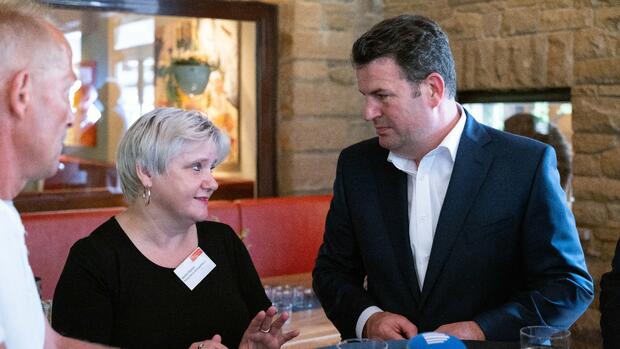Berlin To this day, Monika Miszkiel can hardly believe that she has found work again. “I got my second chance, it’s like winning the lottery for me,” the 58-year-old tells the prominent guest. Labor Minister Hubertus Heil (SPD) came to Dortmund as part of his summer trip to meet with former long-term unemployed.
Miszkiel is one of them. In the 1980s she worked for the AOK until private misfortune threw her off track and made her unemployed. Thanks to intensive coaching at the job center, the lively woman has regained her courage and is now working in the elderly support service.
This is a win for both sides, emphasizes the visibly satisfied minister – the seniors and Ms. Miszkiel. The instruments to combat long-term unemployment are not cheap, but useful, he says. And adds, addressed to the group of former long-term unemployed: “You are living proof that this is money well invested.”
But Heil is also subject to the government’s austerity measures. According to the draft budget, the budget of the Ministry of Labor will increase by around five billion euros to almost 172 billion euros in the coming year. But Heil could not get through to Finance Minister Christian Lindner (FDP) with even higher spending requests.
That is why savings are also being made in the job centers – although the number of long-term unemployed has risen sharply again in the wake of the corona crisis and was 908,000 in June. That’s how many people have been trying for a job for at least a year without success. From 2008 to 2019, the number of long-term unemployed initially fell from 1.3 million to around 727,000, until the trend reversed with the pandemic.
Read more about the federal budget
In view of this development, the chairwoman of the Federal Employment Agency (BA), Andrea Nahles, warns of the planned austerity measures. In the current draft budget for 2024, not enough active labor market funds such as further training or initial qualifications and not enough funds for administrative costs of the job center have been planned, she told the “Welt am Sonntag”.
Ampel wanted to look after the long-term unemployed more intensively with citizen money
According to the former Federal Labor Minister, 700 million euros or 6.6 percent less are available in this area than in the previous budget. “We are simply not sufficiently funded.” The traffic light coalition has actually set itself the goal of intensifying the care of the long-term unemployed with the new citizens’ allowance.
Tailored support for the long-term unemployed only works with sufficient funds.
(Photo: dpa)
At the beginning of this month, the second stage of citizen income came into force. For example, long-term qualification measures can also be paid for. The coaching is also to be expanded. The federal government has also extended one element of the Participation Opportunities Act. With this, employers who hire long-term unemployed people receive wage cost subsidies of up to 100 percent for up to five years. That costs money – and requires planning security with the funds available.
The former long-term unemployed woman is very pleased to have found work again: “I got my second chance, it’s like winning the lottery for me”.
(Photo: J. Konrad Schmidt)
As early as June, the municipalities, which operate the job centers partly together with the BA and partly independently, had therefore contacted the federal government together with the Federal Employment Agency and campaigned for adequate funding for the job centers.
Read more about the Federal Employment Agency
These would have to cope with additional tasks with the integration of the Ukrainian refugees and the basic income, which is why more staff is needed, according to the “Brandbrief” from the German District Association, the German Association of Cities and the BA. In some job centers, the number of employable beneficiaries has increased by up to 30 percent – while budget funds are falling at the same time.
In the current year, the federal government has already reduced the administrative funds for the job centers from a good six billion euros in the previous year to almost 5.3 million euros. According to the draft budget, next year there will be another 200 million euros less. The wage agreement for the public sector alone will increase personnel costs in the job centers next year by 300 million euros, said Nahles.
In the current federal budget, fewer funds are earmarked for the employment agencies.
(Photo: dpa)
Many job centers are already reacting to the cuts and are planning fewer measures for the integration of the long-term unemployed, the head of the authorities emphasized in the “Welt am Sonntag”. Even today, smaller job centers in particular would have to shift up to 80 percent from the budget for active labor market policy to the personnel budget in order to be able to maintain administration at all.
Criticism also comes from the federal states: If the citizen’s income is not to remain just an empty shell, the principle of funding must be lived, said Bavaria’s Minister of Labor Ulrike Scharf (CSU): “Our welfare state is strong, but the unemployed can only be tailored to training and further education support if sufficient funds are available.”
BA boss Nahles announced that she would campaign with the members of the Bundestag to prevent a cut in funds in the parliamentary procedure for the budget law. She should also have her successor in the office of Minister of Labor on her side.
More: An AI for all cases – Heil also wants to bring technology into small companies
